On 10 February 2014 Leonard Nimoy appeared on Piers Morgan’s CNN chatshow for what would be the final interview before his death 12 months later. Nimoy, then 82, had agreed to the gig in order to publicise the dangers of smoking. Although he had quit 30 years earlier, he had recently been diagnosed with chronic obstructive pulmonary disease and, to make the point of how horrible it was, had brought along his oxygenator as a fearful warning. Morgan was just as you’d expect – polite enough about COPD and its ghastly consequences, but bursting to talk Star Trek (Morgan is exactly the right age to have been captivated by the programme – it arrived in Britain in 1969, and ran on a continuous loop throughout the early 70s). After sprinting through a few tired jokes about Vulcan nerve pinches and beaming up, Morgan asks Nimoy about how often he sees the old gang, William Shatner in particular. Without missing a beat, Nimoy says: ‘Not in a while … we don’t have that kind of relationship any more. We used to.”
From there the conversation tacks off into Nimoy’s favourite episode (“Amok Time”), and the weirdness of the early Trek conventions at which thousands of fans would descend on some provincial hotel dressed in bri-nylon pyjamas in an approximation of their favourite Enterprise crew member. But for those of us steeped in Star Trek, which means not simply knowing every one of the 79 episodes almost verbatim but also its many backstage narratives, we had stopped listening by this point. What was that Nimoy had just said? That he was no longer in touch with Shatner? It felt like the mother of all phaser stuns.
One of the founding stories of the Star Trek mythos is how the two original leading men locked horns on meeting in their mid-30s, soon got over their “feud”, and went on to be the most unlikely of best friends, even when the camera was turned off. It was a friendship that had spanned addiction (Nimoy himself and Shatner’s third wife were alcoholics), angry divorces (both of them), a solid stint as a director for Nimoy (Three Men and a Baby, no matter what you think of it, was the top grossing film of 1987) and a respectable acting career for Shatner, who went on to create two other memorable, if not iconic, TV characters, TJ Hooker and Denny Crane in Boston Legal. And now, here was Nimoy admitting that the two had barely spoken for years.
So the big question with Leonard, Shatner’s memoir of the man who was supposed to be his best friend but actually wasn’t, was always going to be whether it would acknowledge and account for this late rift, or make like nothing had happened. In fact, Shatner, whose palpable narcissism has always been shot through with streaks of baffling candour, squares up to the issue head on, admitting near the beginning of the book that he had once had “a very rare, very enviable” friendship with Nimoy “and then I lost it”.
Before he gets down to telling us why, though, there is the how-we-met part of the story to deal with. “Trekkers” (the term Nimoy always preferred to the reductive “Trekkies”) will know this material well. The two men were born in 1931 four days and 300 miles apart, Nimoy in Boston and Shatner in Montreal, into orthodox kosher Yiddish-speaking Jewish families that had emigrated from the Ukraine and thereabouts. Shatner’s father was in the schmatter (clothing) business; Nimoy’s was a barber. The two may have come from what Shatner calls “the same tribe”, but by some kink in the genetic code it was he who came out with blondish hair (though not much of it – these days his toupee has its own website) and eyes that you could believe were blue, even though they were actually hazel. It was a physicality that allowed the young Canadian to make a career in the new world of network television playing all-American heroes: soldiers, astronauts and the occasional cowboy.
Nimoy, by contrast, was obliged to go the route of so many Jewish actors and play a variegated range of ethnic heavies. He was either Latino or Native American in westerns (Gunsmoke, The Virginian) or Italian in low-budget feature films (Kid Moroni) or Russian in The Man from U.N.C.L.E., which is where he met Shatner for the first time, in 1964. Most prophetically, he was a memorable Martian in Zombies of the Stratosphere. There was 17 years of this journeyman work, seldom lasting beyond a week, until Nimoy was cast as Mr Spock in the pilot for a new series, Star Trek, pitched by the producer Gene Roddenberry as “Wagon Train to the Stars”.
It wasn’t simply the two men’s contrasting appearance that defined their early career options (“choices” would imply far too much autonomy – they took everything they were offered). Shatner is excellent on the way that he and Nimoy’s story also turns on the distinction between their acting styles. Shatner, who had trained under Tyrone Guthrie at the Stratford Shakespeare festival in Ontario, was always an outside-in player, fluent in the kind of stagey gestural acting that you associate with prewar Olivier. By the time he got to perform Kirk as an essentially Shakespearean hero, brave but given to soul-wrenching soliloquies, Shatner had yanked the English language out of any natural rhythm into a wilfully bumpy pattern of pauses, bunching and sudden rills.

Nimoy, by contrast, was “method” through and through. He started from the inside and worked outwards, and the result was a kind of mannered naturalism. Fine if you were doing Clifford Odets on Broadway, but slightly laborious if you were playing a character who could best be summed up by a pair of latex rabbit ears and a slathering of Max Factor “Chinese Yellow”.
Still, it worked. Shatner’s scenery-chewing allowed Nimoy to retreat into the internalised drama of Spock, a creature caught between his rational Vulcan brain and his messy human heart. In the pilot episode, in which the captain’s role was taken by another actor with method tendencies, Jeffrey Hunter, the result is deeply uncomfortable. With far too much empty space between them, Nimoy is obliged to make Spock a larger, flashier presence. At one point he even smiles, a shocking moment that threatens to fracture the whole Star Trek universe before it has started to cohere, and would take the first part of series one to put back together again.
If you know your Star Trek you will have gathered much of this already from the small army of books written over the years by anyone remotely involved with the programme, including Shatner and Nimoy themselves (Shatner, in particular, is a serial autobiographer). What Leonard adds to the mix is a new late-life awareness on Shatner’s part about how both he and his former best friend were profoundly shaped by the immigrant experience. He puts both his and Nimoy’s family-shattering workaholism down to an inherited terror of losing everything. Indeed, Nimoy had grown up in an atmosphere of such fear that when, in the early 1970s, his parents are invited to accompany their famous son back to their Ukraine village by an expansive Russian ambassador looking for a photo opportunity, they are appalled. Convinced that it is a plot to put them in prison for having snuck out in a hay cart 60 years earlier, they refuse, leaving Nimoy to travel to Zaslav alone to meet his equally baffled and fearful cousins.
In Shatner’s case, the inheritance of terror shows up in a hyperkineticism that still has him, about to turn 85, touring the world with his one-man show and tweeting several times a day in a desperate need to keep making his mark. But even he is obliged to stop dervishing for long enough to ponder the big questions, including what went wrong in his friendship with Nimoy. Admitting that that “until Leonard and I had developed our relationship … I didn’t even know what a friend was”, Shatner nonetheless insists that he has no idea what he did that made Nimoy drop him suddenly in 2011.
You do, of course, have to wonder at Shatner’s emotional intelligence. This, after all, is a man who agreed to be a guest photographer on a Playboy spread but kept it secret because he knew his wife wouldn’t like it, and then seems genuinely surprised when she finds out and is, predictably, furious. Thus it is a mark of Shatner’s transparency that he admits to the freeze with Nimoy and a mark of his cloddishness that he genuinely doesn’t know what caused it: “It remains a mystery to me and it is heartbreaking.” And that, really is the irony of this book, indeed of the whole Nimoy-Shatner saga. Shatner, who always seemed like the less interesting man, is the one who ends up keeping you hooked into a narrative that started 50 years ago and shows no sign of yielding up all its riddles any time soon.
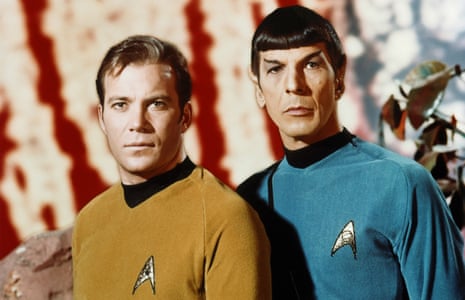
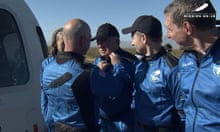
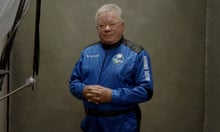
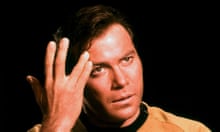

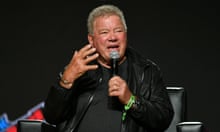




Comments (…)
Sign in or create your Guardian account to join the discussion